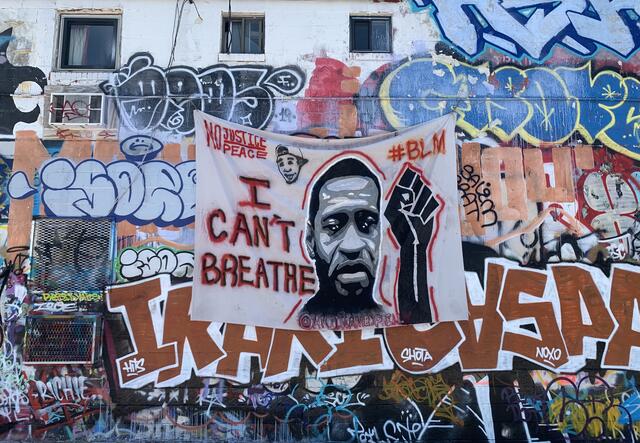
Dear friends of the IRC,
As a person of color, husband to a Black woman and father of a 11-year-old son, my family experiences heartbreak, anger and fear every time the police shoot, strangle or brutally kill another Black person. I have no way to console my wife or son every time the police brutally extinguish a Black life. How does one offer consolation for an injustice when it is unrelenting, systematic and multigenerational? How do I reassure my wife and son to not be fearful of the police when both have grown up seeing people who look like them become victims of police violence? It is almost unfathomable to think that there are millions of families that experience trauma and anger, either as a direct result of having lost a loved one to police violence, or indirectly because they fear falling victim to this sort of violence.
The slow and methodical killing of George Floyd by Minneapolis police officers has traumatized Black families and communities once again and stirred the righteous anger of millions of people. Watching the police officer kneel on the neck of Mr. Floyd for 8 minutes and 46 seconds is traumatizing and infuriating to many. We have seen some of this trauma and anger express itself in the streets across the country, and globally, over the last few weeks. While the coronavirus pandemic succeeded in keeping most people home for fear of exposure to COVID-19, the egregious murder of Mr. Floyd by the Minneapolis police has united millions in the streets. The protests have been overwhelmingly peaceful and have denounced the systemic presence of anti-Black racism in American life and particularly in police departments.
The protests focusing on police brutality have been sustained in many communities in Maryland for over three weeks. On Saturday June 13, protestors demanded that Baltimore City Council defund the police and invest those resources to strengthen public education and other social services. On Monday June 15, the budget committee of Baltimore City Council recommended a $22 million reduction to the police budget. This recommendation will need the support of the full City Council to be implemented. In a similar vein, County Executive Elrich announced that the Montgomery County Police Department and the Fraternal Order of Police have agreed to a new policy requiring officers to intervene when they witness excessive force by other officers. The Use of Force Intervention Policy, which went into effect on Thursday, June 11, states that it shall be the duty of every officer present at any scene where physical force is being applied to either stop, or attempt to stop, another officer when force is being inappropriately applied or is no longer required. While the voices of the protestors are being heard and acted upon across the country, many more significant policy changes need to be implemented to end anti-Black racism and police brutality in the U.S.
Over the last three weeks, the staff of the IRC in Maryland have also been discussing the issue of police brutality during our weekly staff meeting. While we have a very diverse team of over 60 staff from many nationalities and U.S. cultures, we stand united in our denunciation of anti-Black racism and police brutality. Many staff are committed to educating themselves on these issues and working in solidarity to oppose anti-Black racism when they encounter it. The IRC is also discussing how to meaningfully engage our clients across the U.S. on the issues of anti-Black racism and police brutality and ensure senior leadership positions in our offices and at headquarters are staffed by more people of color.
Like much of what is happening across the country in the aftermath of Mr. Floyd’s murder, the discussions and actions being taken within the IRC are far from resolved. However, our CEO, David Miliband and board of directors are committed to addressing these issues as part of our strategic plan, and I feel a renewed commitment by the organization to hold itself accountable.
I am under no illusion that the changes being proposed within and outside the IRC to address anti-Black racism and police brutality will be easy to achieve. We must work hard to ensure the murder of Mr. Floyd, and many others like him by the police, leads to positive social change. I will certainly do all I can to sustain this work, for my family and my community.
Thank you for taking the time to read my message and for all that you do to support the work of the IRC in Maryland. Thanks also for doing your part to end anti-Black racism and police brutality in our communities.
Sincerely,
Ruben Chandrasekar
Executive Director, IRC in Maryland